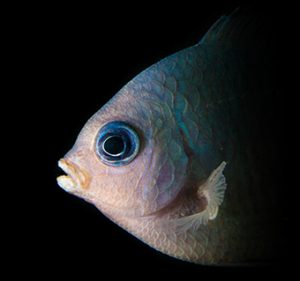 22 March 2017
22 March 2017
Ocean acidification caused by increased levels of dissolved CO2 can have significant effects on marine ecosystems. Behavioural and chemosensory abnormalities associated with exposure to elevated CO2 are reported to be among the greatest threats to fishes, particularly coral reef fishes. Most previous studies have investigated the effects of short-term exposure to elevated CO2 exposure, but to improve the ability of marine biologists to confidently predict the future effects of CO2 on marine ecosystems, Josefin Sundin from the Department of Neuroscience at Uppsala University, Sweden, wanted to investigate effects associated with long-term exposure to elevated CO2.
She applied for a Travelling Fellowship from the Journal of Experimental Biology to fund a research visit to Dr Timothy Clark at the Australian Institute of Marine Science (AIMS) in Townsville, Australia. Access to CO2-acclimated coral reef fish and state-of-the-art infrastructure made Dr Clark’s lab at AIMS one of the few places where the proposed project could be performed. There, Josefin collaborated with Drs Mirjam Amcoff, Fernando Mateos-González and Graham Raby to test the effects of long-term CO2 exposure on behavioural responses and chemosensory sensitivity. To their surprise the team found no effect of long-term CO2 exposure; when subjected to various chemosensory stimuli, the fish kept at elevated CO2 behaved the same as those kept at present-day CO2. The findings highlight the need for adequate exposure durations and cross-lab validation studies to elucidate the ecological effects of ocean acidification. Josefin reflects that the opportunity her Travelling Fellowship from The Company of Biologists gave her to work at world-leading tropical marine research agency AIMS was important for her career as a young scientist. Her time at AIMS gave her the opportunity to conduct crucial research and to meet and collaborate with researchers working in the front line of marine science and technology. Photo credit: Fredrik Jutfelt.








You must be logged in to post a comment.